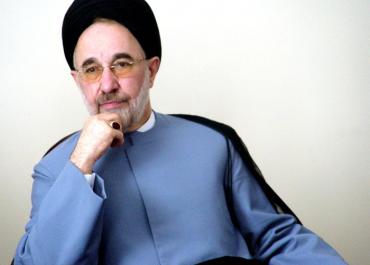
 ‘All factions to defend Iran against foreign threat’
‘All factions to defend Iran against foreign threat’
Holding free elections is the best way for safeguarding the country’s security, Mohammad Khatami told a group of reformists.
On the prospect of a military strike against Iran over its nuclear programme, the former Iranian President predicted that “if one day, a foreign force interferes in the country’s [affairs], both reformists and non-reformists will stand up against it.” He expressed hope that holding free elections and enhancing civil liberties could thwart the threat of military action against the country.
Khatami, who was speaking at a gathering of reformist Azeri activists, once again called for the release of all political prisoners and an opening up of the political atmosphere, while warning that time was “running out fast.”
The former head of Iran’s pro-reform government between 1997 and 2005 said that “elections are not the absolute possession of anyone, they are the right of every single Iranian, and if free, fair, and competitive elections are held, everyone will take part in them.”
“[However] elections can’t be held in a manner acceptable only to one particular [political] group, with the rest constrained and forced to participate. [Under such conditions] even if [community] leaders and influential figures call upon people to take part, they will not do so.”
The veteran reformer’s comments come amidst growing speculation regarding a possible boycott of the upcoming parliamentary elections by Iran’s powerful reformist factions, including the outlawed Islamic Iran Participation Front (IIPF) and the Mujahedin of the Islamic Revolution Organisation (MIRO). Opposition groups have called for an end to the house arrest of opposition leaders Mir Hossein Mousavi and Mahdi Karroubi, the release of political prisoners and free and fair elections, as some of the preconditions for their participation in the race.
“A requirement for desirable elections is a free and competitive environment. It’s regrettable that we are not witnessing such an atmosphere, but the exact opposite is true. Groups, factions and parties are faced with many limitations,” Khatami noted. “As of late, instead of releasing prisoners, the constraints have intensified. Many have been summoned to prison. Harsh new sentences are issued and individuals are confronted for their statements or signatures [bellow letters], many are summoned and questioned. This atmosphere must change.”
“Today, at least theoretically, no [political] system is accepted unless it is a democracy,” said Khatami, whose landslide victories in Iran’s presidential elections reenergised the pro-democracy movement that emerged in the mid-90s. “I consider the alternative to democracy to be tyranny and dictatorship. Democracy might have its flaws … which have been pointed out in the west too, but its alternative is horrific.”
The former two-time head of the Islamic Republic’s Executive Branch went on to add, “Reforms are not a thesis, or a project, but a social process. [Reform] is a social current. Reforms have been going on in this country for the past 150 years. The Constitutional [Revolution] was the outcome of our reform and Reza Khan’s dictatorship was a defeat for our reform [movement].”
In what seemed to be a reference to recent remarks by supreme leader Ali Khamanei about the scrapping of the presidency in favour of a prime minister chosen by a parliamentary majority, Khatami stated “the fundamental [question] is whether [the change] is in accordance with democracy or not. If it is, then it is not problematic, but if it isn’t, then both of these two [systems] can be problematic. The issue of concern here is the significance of the people’s vote. Are the people able to express their opinions? To what extent do their opinions and beliefs influence the fate of society? … To what extent do the ruling institutions stem from the prevailing views in society?”
Khatami also commented on the mounting sabre-rattling by Israel and the United States against Iran, stating that releasing political prisoners and holding free elections would ensure the country’s security.
“Great dangers threaten us.”
He suggested that the mounting pressure on Iran was part of a “scenario” and “plot” orchestrated by western powers and that Iran was not seeking nuclear weapons.
Referring to the 2007 National Intelligence Estimate report that judged “with high confidence” that Tehran had halted its nuclear weapons programme in fall 2003, Khatami said, “I was not president at that time [in 2007], but I stated that even prior to 2003 our activities did not have a military nature. Now how is it that in 2011, they’re suddenly claiming that [Iran’s nuclear] activities are intended for military purposes?”
“Harsh comments are being made by military commanders and officials in Israel and some in the west. In my opinion, a lot of it is psychological warfare and a bluff, nevertheless they are preparing public opinion” for a possible confrontation, he explained.
“Unfortunately, both in the US and in Iran, there are those who would like this to lead to violence and for the situation to escalate. I hope that Mr Obama is not influenced by them and draws lessons from Mr Bush’s ways. In Iran too, there are those who profit from crises, violence and tension, and might favour an exacerbation of the situation.”
Click HERE to read more.

Its all a ploy to keep the world waiting, as the
Iran nuclear program moves forward at full speed